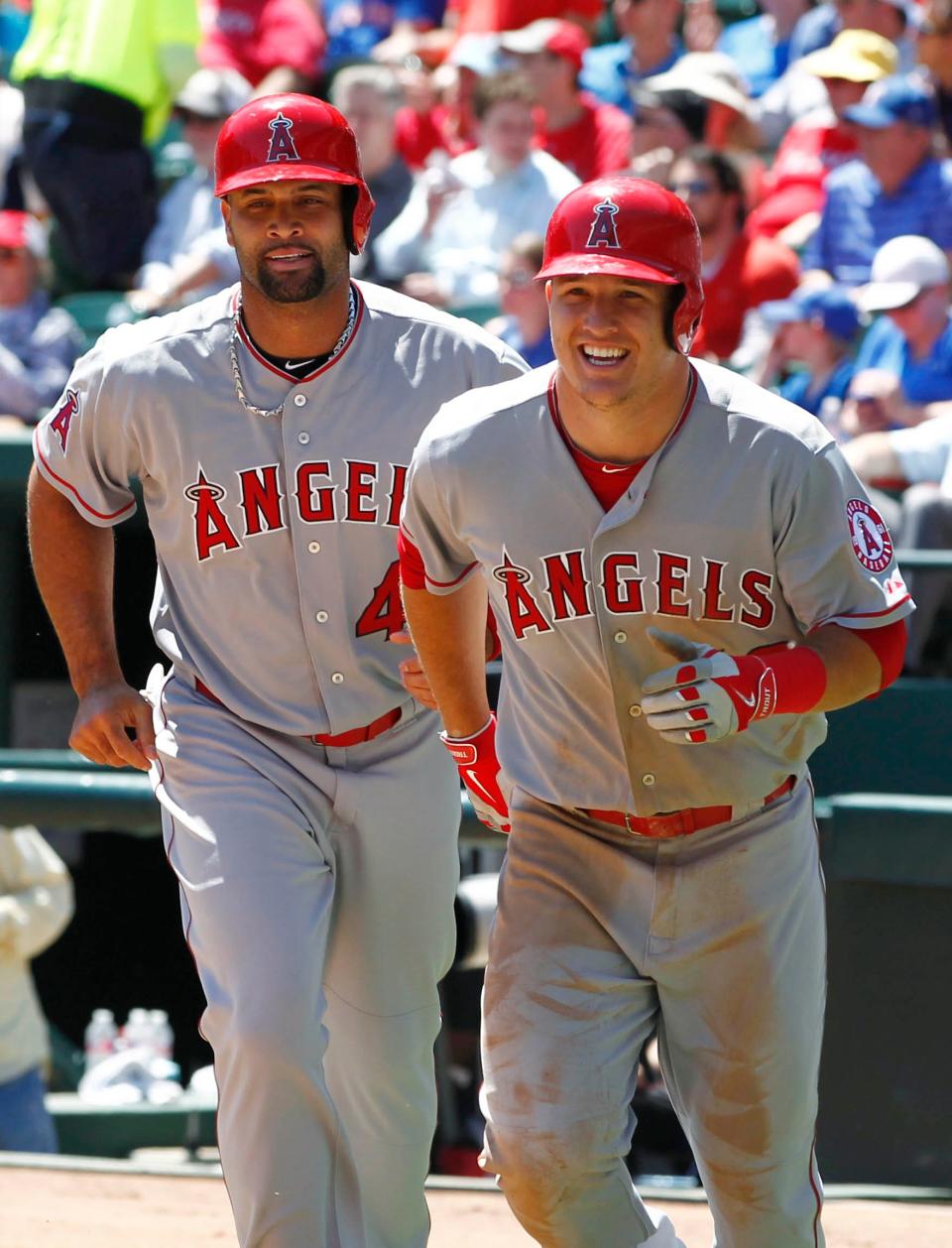As Albert Pujols aged, baseball got a lot younger - and the Angels paid the price
- Oops!Something went wrong.Please try again later.
Albert Pujols’ time with the St. Louis Cardinals cemented his status as a Hall of Famer, possibly the greatest right-handed hitter of his generation.
His legacy with the Los Angeles Angels is far broader, and less flattering.
Pujols’ tenure with the Angels expired before his contract did, the club cutting him loose five weeks into the final season of their 10-year, $240 million commitment, a watershed signing for reasons we didn’t fully grasp.
Baseball was once again about to become a young man’s game.
Three weeks after Pujols debuted as an Angel in 2012, Mike Trout returned to Anaheim and never left, launching a Rookie of the Year and MVP runner-up campaign that, paired with Bryce Harper’s emergence in the National League, seemed like bolts from the blue.
Instead, as Pujols, 41, aged ungracefully – at least on the field – and Trout quickly revealed his all-time talent, that period will be remembered as the dawn of the new normal.
Sure, when the Angels went beyond the Cardinals’ commitment in years and the Marlins’ salary guarantee to sign Pujols, it was widely assumed owner Arte Moreno would be on the hook for a couple of ugly seasons at the end of Pujols’ contract.
Instead, the deal became a harbinger that the greatest production, the greatest value and, eventually, the greatest paydays would go to the young.

Pujols’ deal isn’t The Last Bad Contract, but it’s close. His right-handed hitting demigod contemporary, Miguel Cabrera, is due $102 million from this season through 2023 and Cabrera’s 17-game slash line this year is .098/.179/.213. Chris Davis, buried in Baltimore, will make $23 million this season and next.
But Cabrera’s extension and Davis’s re-signing were more the whims of an owner wanting to keep his guy home, a sentiment that worked out well for Detroit with Justin Verlander, not Cabrera.
The Pujols deal was among the last of its kind, a make-a-splash pact with a 30-plus talent.
And then the 2010s happened.
Have we seen a greater rate of change in a single decade of baseball? Fastballs sizzled, defensive shifts chilled even the greatest hitters, and those unable or unwilling to adapt soon became liabilities.
Meanwhile, Trout and Harper soon were followed by Carlos Correa and Corey Seager and Cody Bellinger and Ronald Acuna Jr. and Pete Alonso and Juan Soto and Fernando Tatis Jr. – young, readymade superstars who’d dominate this decade like Pujols dominated the 2000s.
SWEET REVENGE: Opinion: Jose Altuve celebrates his birthday by getting revenge on taunting Yankees fans
UPCOMING: Top prospects to watch as minor league baseball season gets underway
Pujols won three MVPs that decade and finished his St. Louis stint with a fifth-place finish in 2011. The average age of an MVP winner from 2001-2010? Aided by Barry Bonds, 29.3.
From 2011-2020, that average age dropped to 26.5, with seven winners age 25 or younger, compared to two in Pujols’ heyday.
Now, compensation is reflecting this reality.
Thirtysomethings, in case you haven’t heard, are having trouble getting a job at all, let alone a decade-long commitment. Meanwhile, Trout (12 years, $426.5 million), Tatis (14 years, $340 million), Harper (13 years, $330 million) and Manny Machado (10 years, $300 million) achieved landmark deals before their 27th birthday.
Achievement is coming quicker and so, too, are the paydays, with teams minimizing their risk on the back end of the deal. Sure, Harper may need the Phillie Phanatic’s ATV to get around the Citizens Bank Park bases at 38, but his deal and Tatis’s were structured to be luxury tax-friendly.
In short, few regrets in sight.
The Angels probably have a few, and perhaps, deep down, Pujols as well, given his dearth of defining moments and relative lack of connection with Angels fans relative to his glorious stint in St. Louis.
But it’s hard to argue with the guaranteed money he received, with which he will do many good works. Now, Pujols is moving on, the last of his era in many ways.
This article originally appeared on USA TODAY: As Albert Pujols aged, baseball got a lot younger - and Angels paid price

